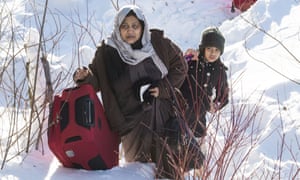
Photograph: Paul Chiasson/AP
Canada
Canadian woman transporting asylum seekers charged with human smuggling
Michelle Omoruyi, a Canadian resident, arrested as part of investigation into smugglers allegedly facilitating illegal crossings of foreign nationals from US
Police in Canada have charged a woman with human smuggling after intercepting nine asylum seekers from west Africa who crossed irregularly into the country from the US.
The Royal Canadian Mounted Police (RCMP) said on Wednesday that a 43-year-old woman had been arrested days earlier after she was found driving nine people in an isolated area north of the Canada-US border.
The following day, police seized a significant amount of cash at a home in the Canadian province of Saskatchewan connected to the same woman.
Michelle Omoruyi, a Canadian resident, has been charged with human smuggling and conspiracy to commit human smuggling.
The arrest was part of an investigation launched in December 2016, said Jason Evert of the Canadian Border Services Agency. “Throughout the course of the investigation, the CBSA uncovered evidence to suggest suspected smugglers were allegedly bringing foreign nationals into Canada from the United States by facilitating their illegal crossing between designated ports of entry.”
The US Border Patrol has also arrested several others in connection with the investigation, but has yet to release details.
The nine migrants were handed over to border officials. All of them have applied for refugee status and have since been released while they wait for their claims to be heard. Police declined to give any other information about the group, citing privacy concerns.
Recent months have seen at least 1,860 asylum seekers brave freezing temperatures, waist-deep snow and icy rivers to cross into Canada from the US by foot.
Entering the country at remote, unguarded locations allows migrants – many of whom are anxiously fleeing Donald Trump’s crackdown on immigrants – to skirt a longstanding pact that bars most refugee claimants in the US from applying for asylum in Canada.
The 2004 pact, known as the Safe Third Country Agreement, forces most migrants to apply for asylum in the first country in which they arrive. Advocates on both sides of the border have long urged the Canadian government to suspend the agreement, warning that it leaves asylum seekers looking to enter Canada from the US with little choice but to resort to hazardous journeys.
“At the moment, one of the byproducts of the agreement is that we create incentives for people to cross irregularly and that gives business to smugglers and puts peoples’ lives and their safety at risk,” Janet Dench of the Canadian Council for Refugees told the Guardian earlier this year.
The human smuggling charge is the first of its kind in Saskatchewan this year, said police. The province has been among the few that has not seen a substantial rise in asylum seekers streaming in across the US border, perhaps due to its status as one of the few provinces that does not offer legal aid to refugee claimants.
On Wednesday, police gave few other details about the charges, describing them as part of an ongoing investigation. Donovan Fisher of the RCMP said human smuggling charges are generally not laid if humanitarian reasons are believed to be the motive for aiding or facilitating the migrants.
“Of course we had to take the interest of these immigrants into consideration as well; generally they’re coming from a state where they’re potentially at risk or looking for a better life and sometimes desperate,” he said. “They’re vulnerable and may be taken advantage of by people looking to gain financially from their situation. So that’s generically what we would be looking at.”